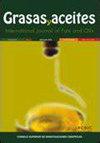Removal of DBP from evening primrose oil with activated clay modified by chitosan and CTAB
IF 1.1
4区 农林科学
Q4 CHEMISTRY, APPLIED
引用次数: 1
Abstract
The pollution of phthalic acid esters (PAEs) in edible oils is a serious problem. In the current study, we attempt to remove dibutyl phthalate ester (DBP) from evening primrose oil (EPO) with modified activated clay. The activated clay, commonly used for de-coloration in the oil refining process, was modified by chitosan and hexadecyl trimethyl ammonium bromide (CTAB). The modifications were characterized by SEM, XRD, and FT-IR. We further tested the DBP adsorption capacity of CTAB/chitosan-clay and found that the removal rate was 27.56% which was 3.24 times higher than with pristine activated clay. In addition, the CTAB/chitosan-clay composite treatment had no significant effect on the quality of evening primrose oil. In summary, the CTAB/chitosan-clay composite has a stronger DBP adsorption capacity and can be used as a new adsorbent for removing DBP during the de-coloration process of evening primrose oil.壳聚糖和CTAB改性活性粘土去除月见草油中的DBP
邻苯二甲酸酯(PAEs)在食用油中的污染是一个严重的问题。在本研究中,我们尝试用改性活性粘土去除月见草油(EPO)中的邻苯二甲酸二丁酯(DBP)。采用壳聚糖和十六烷基三甲基溴化铵(CTAB)对炼油过程中常用的脱色活性粘土进行了改性。通过SEM、XRD和FT-IR对改性物进行了表征。进一步测试了CTAB/壳聚糖-粘土对DBP的吸附能力,发现其去除率为27.56%,是原始活性粘土的3.24倍。此外,CTAB/壳聚糖-粘土复合处理对月见草油的品质无显著影响。综上所述,CTAB/壳聚糖-粘土复合材料具有较强的DBP吸附能力,可作为月见草油脱色过程中DBP的新型吸附剂。
本文章由计算机程序翻译,如有差异,请以英文原文为准。
求助全文
约1分钟内获得全文
求助全文
来源期刊

Grasas y Aceites
工程技术-食品科技
CiteScore
2.50
自引率
0.00%
发文量
50
审稿时长
3 months
期刊介绍:
Grasas y Aceites is a peer-reviewed journal devoted to the publication of original articles concerning the broad field of lipids, especially edible fats and oils from different origins, including non acyl lipids from microbial origin relevant to the food industry. It publishes full research articles, research notes, reviews as well as information on references, patents, and books.
Grasas y Aceites publishes original articles on basic or practical research, as well as review articles on lipid related topics in food science and technology, biology, (bio)chemistry, medical science, nutrition, (bio)technology, processing and engineering. Topics at the interface of basic research and applications are encouraged. Manuscripts related to by-products from the oil industry and the handling and treatment of the wastewaters are also welcomed.
Topics of special interest to Grasas y Aceites are:
-Lipid analysis, including sensory analysis
-Oleochemistry, including lipase modified lipids
-Biochemistry and molecular biology of lipids, including genetically modified oil crops and micro-organisms
-Lipids in health and disease, including functional foods and clinical studies
-Technical aspects of oil extraction and refining
-Processing and storage of oleaginous fruit, especially olive pickling
-Agricultural practices in oil crops, when affecting oil yield or quality
 求助内容:
求助内容: 应助结果提醒方式:
应助结果提醒方式:


